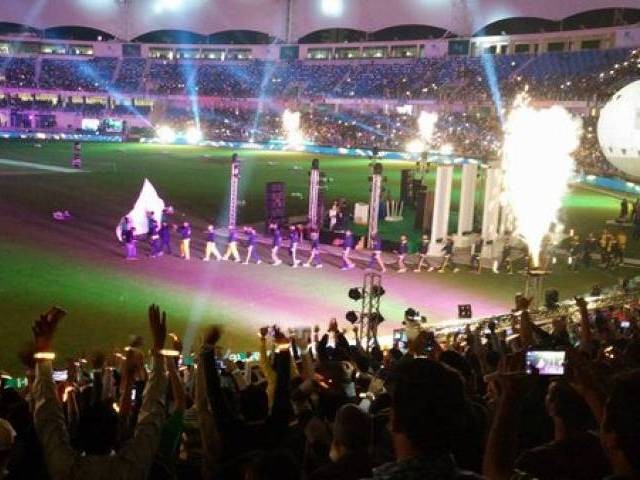
If we do not think out of the box about PSL’s future, it will crumble

Pakistan Super League (PSL) has, finally, arrived with great fanfare. There is no doubt that having a league, and more importantly teams, of our own gives us a sense of ownership which we do not experience with IPL or the Big-Bash. There is good reason to celebrate PSL but equally important reason to critically analyse its direction.
The most obvious merit of PSL is that it puts Pakistan on the map of T20 leagues and it also promotes local talent. Development of local talent has multiple aspects; there are the more obvious benefits such as young players sharing a dressing room with more experienced global and local stars. Apart from this, young talent will also be exposed to big crowds and pressure situations -- honing their mental toughness and the ability to absorb pressure. However, the fact that matches are not being played in Pakistan (and to be fair PCB cannot help this) seriously affects the crowd-attendance. In turn this will have an impact on the potential learning curve of the young players to perform under pressure.
Newspaper reports have said that the salary cap is USD 985,000/- for a team of 16. PSL chose to forego the auction method in favour of the salary cap method for selecting players. While this may work in the first couple of years, sticking to the salary cap would mean that PSL will find it extremely difficult to consistently attract top global talent. Attracting top global talent, for the benefit of PSL as well as the local players participating in it, is already an up-hill battle. Bear in mind that crowd pullers from India and other major cricketing nations will either not be invited or will need a fair amount of persuasion before becoming a part of this endeavour. While this may seem unfair, and there is no doubt that IPL teams’ refusal to pick Pakistani players is repulsive, PSL will need to create conditions for its own survival. The hand that we have been dealt may be unfair but it is what it is.
Putting a cap on salary will, in the long run, also mean that as the value of top global players rises the local talent will receive a consistently small portion of the budget. This is not necessarily a bad thing since the aim here should be to develop talent -- financial remuneration should be a secondary, albeit an important, consideration for local players. Organizers of PSL would do well to consider increasing the size of the teams since the greater the team size the greater the exposure of local talent.
There is a finite amount of cricket to be played and merely helping develop breathtaking Pakistani talent may not be a big enough attraction for everyone in the long run. Hence one option could be to allow franchises a certain amount of time before moving to the auction method. But the direction should be specified as soon as possible so that PSL remains a viable option.
There are very Pakistani elements of PSL on display already. Lack of organisational skills has been painfully apparent at times. The franchises, for the most part, did a shoddy job of marketing. Their merchandise was not available in the market when PSL was launched. The handling of their social media accounts created a buzz that was spotty at best. Closer to the launch, the activity picked up (even though merchandise remained missing). The audience of PSL today does a far better job of marketing it than the electronic or social media platforms responsible for the same. While one can say that this is how social media works, the fact remains that the franchises could and should have done a far better job of marketing PSL. A large number of people may currently be involved in celebrating PSL but this should not cause us to overlook the fact that things could have been much better.
The hard fact remains that bringing international cricket back to Pakistan is an uphill battle. PSL gives us all a sense of ownership but if we do not think out of the box about its future then it will crumble. The same franchises, even without foreign players, should seriously consider playing games against each other in Pakistan. Even a shortened version of the tournament will keep it relevant and alive. While selling it to foreign audiences is important, PSL will only flourish if local ownership (at commercial and audience level) grows.
So while we celebrate PSL, we the audience must also debate its future viability. Our primary aim should be to ensure that local talent develops. As talent grows more exciting, it will bring in crowds and franchise owners will make money. An important consideration is the future financial viability of PSL -- and its ability to remain competitive. Franchise owners and PCB must continue to explore avenues to ensure that the size of the pie grows -- while bringing on board a greater number of players.